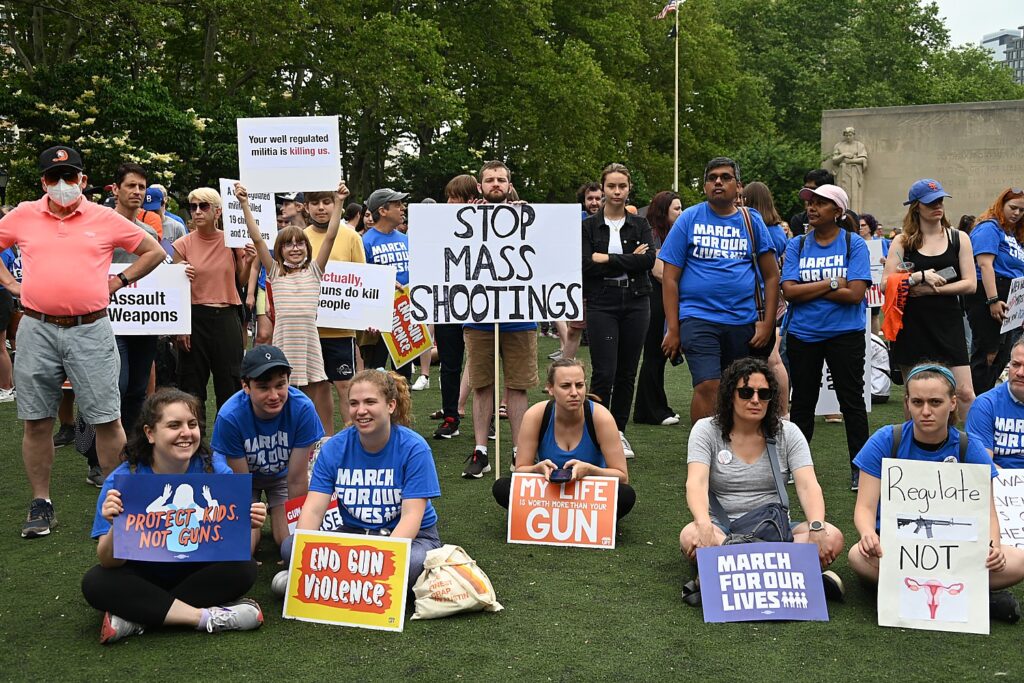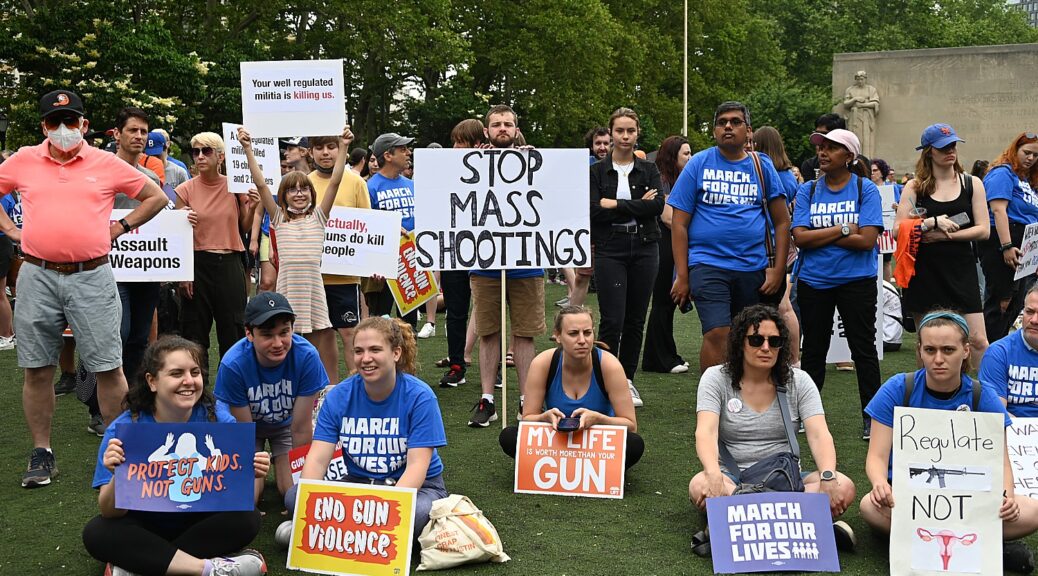
Taking stock of the horror of gun violence that has taken too many mothers, too many children, and broken too many families, President Biden on Mothers Day (and the one-year anniversary of the Buffalo massacre at Topps Grocery and the Uvalde school massacre two weeks later) announced 13 actions the Biden-Harris Administration is taking to implement the Bipartisan Safer Communities Act (the first gun control law to pass in 30 years) and maximize the benefits of the law, reducing gun violence and saving lives by keeping guns out of dangerous hands. – Karen Rubin/news-photos-features.com
President Joe Biden announced 13 actions he is implementing under the Bipartisan Safer Communities Act to reduce gun violence and save lives by keeping guns out of dangerous hands. These include:
Keeping guns out of dangerous hands
The White House, in partnership with DOJ, will convene state and local law enforcement leaders to solicit their collaboration on the Bipartisan Safer Communities Act (BSCA) implementation priorities, such as: 1) increasing state and local law enforcement agencies’ response rates to enhanced background check inquiries when someone under age 21 tries to purchase a gun; and 2) ensuring that arrest and adjudication records include additional documentation of dating relationships to keep more guns out of the hands of domestic abusers.
The White House, in partnership with DOJ, will convene state legislators and governors’ offices, urging them to enact laws allowing the federal background check system to access all records that could prohibit someone under age 21 from purchasing a firearm.
DOJ is working with state and territory governments and local law enforcement agencies to increase their response rates to the federal background check system inquiries when someone under age 21 tries to purchase a gun. DOJ has held 18 webinars to date, attended by more than 500 law enforcement agencies, and has nine more planned.
DOJ is training federal law enforcement and educating state and local law enforcement and prosecutors on the need for additional documentation of dating relationships in domestic abuse cases in order to implement BSCA’s provision that narrowed the “boyfriend loophole,” helping to keep guns out of the hands of domestic abusers.
Ensuring BSCA’s mental health funding helps those dealing with the grief and trauma resulting from gun violence
The Secretaries of HHS and ED will urge governors to use BSCA and Medicaid’s funding to help schools address the trauma and mental health challenges resulting from gun violence.
HHS will educate health and social service providers, community leaders, and other individuals on the effects that gun violence trauma can have on communities.
HHS will clarify how early childhood providers can use BSCA funding to address mental health and gun violence trauma.
HHS will highlight stories of how communities are effectively using BSCA’s mental health funding to help those impacted by gun violence, in order to encourage other communities to adopt those strategies and effectively use BSCA’s resources.
HHS will meet with trauma program grantees and select community members and providers to gather community-level data pertaining to the link between exposure to gun violence and trauma. Lessons learned will inform HHS’ future program development, and a report HHS will make available to other communities.
As part of the school-based services Technical Assistance Center established under BSCA, HHS and ED will jointly develop resources for states and schools regarding how schools can use Medicaid to fund school-based health services to help students dealing with the physical and emotional impacts of gun violence.
Making schools safer
The Department of Homeland Security (DHS) will launch a dedicated public campaign to bring greater awareness to SchoolSafety.gov and its available resources and evidence-based practices. The campaign will be geared towards K-12 leaders, school administrators, teachers, school personnel, and parents and legal guardians.
ED has taken several steps to help states and school districts make effective use of BSCA’s $1 billion Stronger Connections Grant Program to improve school safety. For example, ED hosted a four-part webinar series that highlighted evidence-based practices for supporting student safety and well-being and published extensive Frequently Asked Questions to help states and school districts understand how they can effectively use this funding to ensure all schools are safe and welcoming to all students.
Expanding community violence interventions
To help communities maximize the benefits of BSCA’s community violence intervention funding, DOJ hosted a five-part webinar series to help local leaders use evidence-informed strategies to reduce violence.
Highlights of Progress Made to Implement BSCA
Keeping guns out of dangerous hands
DOJ has invested resources to investigate and prosecute violations of BSCA’s new provisions related to firearms trafficking and straw purchasing (purchasing a firearm for another person who is prohibited from buying the gun). DOJ is coordinating with non-DOJ federal law enforcement agencies to identify criminal investigations eligible for application of these criminal authorities. As a result, DOJ has already charged more than 60 defendants for violating these provisions and seized hundreds of firearms in connection with those cases. For example:
Mexican Resident Sent to Prison for Trafficking Firearms Under New Law
Four Gun Traffickers Charged with Selling Over 50 Firearms in Brooklyn
Nine Men Charged with Roles in Gang-Led Drug and Gun Trafficking Network
Two charged in scheme to illegally purchase firearms and transfer them to others
Federal Prosecutors Aggressively Pursuing Those Who Lie in Connection With Firearm Transactions
In part due to BSCA’s revised definition of who is “engaged in the business” of dealing in firearms, DOJ’s prosecutions for unlicensed dealing increased 52% from FY 2021 to FY 2022. DOJ is on track to maintain this elevated level in FY 2023.
DOJ has implemented BSCA’s enhanced firearms background checks for individuals under the age of 21 in all 43 jurisdictions where the federal government processes background checks. Since November 2022, DOJ has conducted more than 89,000 of these checks and denied more than 160 firearms transactions solely because of BSCA. Out of the 13 states that process their own background checks, 10 states have fully implemented the enhanced background checks. DOJ is providing technical assistance in the remaining three states.
DOJ awarded over $230 million for state crisis intervention programs, including extreme risk protection orders (also known as red flag laws), to temporarily keep guns out of the hands of those who are a danger to themselves or others. This funding is supporting communities in 49 states, territories, and the District of Columbia.
The federal gun background check system (the National Instant Criminal Background Check System) implemented BSCA’s updated definition of misdemeanor crime of domestic violence, which now includes qualifying dating relationships to keep more guns out of the hands of domestic abusers.
DOJ has provided multiple trainings for federal prosecutors and federal law-enforcement agents on a number of BSCA’s provisions, including the updated definition of “engaged in the business,” the new straw purchasing and firearms trafficking provisions, and the expanded definition of misdemeanor crime of domestic violence to include abusive dating partners.
Improving school safety
DOJ awarded almost $60 million in BSCA grants to support school safety. This funding will help institute safety measures in and around schools, support school violence prevention efforts, provide training to school personnel and students, implement evidence-based threat assessments, and fund research and evaluation on the causes and consequences of school violence.
ED awarded states nearly $1 billion from BSCA’s Stronger Connections grant program to support schools in providing students with safer and healthier learning environments and support students’ social, emotional, physical, and mental well-being. Per BSCA, states are tasked with developing competitions for high-need school districts to apply for funding, which they may use for purposes such as expanding school-based mental health services, addressing the physical security of schools, providing safety and violence prevention programs, and creating and implementing emergency operating plans. States are in the process of awarding these grants now.
ED awarded BSCA’s $50 million in funding for out-of-school time programs to use to increase attendance and engagement of students in the middle and high school grades.
Improving access to mental health care
HHS has already awarded nearly $400 million in BSCA funding to increase mental health services in the community, expand school-based mental health services, expand and strengthen the mental health workforce, and improve mental health crisis services. For example:
HHS awarded $60 million to help better equip primary care residents to provide behavioral health care. This funding is anticipated to support approximately 3,500 residents over five years.
HHS awarded $18 million to 49 states, jurisdictions, and Tribes to provide technical assistance and enhance the pediatric mental health care workforce’s capacity to make early identification, diagnosis, treatment and referral of behavioral conditions a routine part of children’s health care services; particularly in pediatric, emergency services and schools.
HHS awarded $59.4 million in supplemental Community Mental Health Block Grant funding to states, helping to expand access to prevention, treatment, and crisis services.
HHS awarded $57.7 million in Mental Health Awareness Training grants to prepare and train school personnel, emergency first responders, law enforcement, and others to recognize the signs and symptoms of mental health challenges and enable early intervention.
HHS awarded $19.5 million to National Child Traumatic Stress Network to improve treatment and services for children, adolescents, and families who have experienced traumatic events.
HHS awarded $73.6 million for Project Advancing Wellness and Resiliency in Education (Project AWARE) to help develop and support school-based mental health programs and services. This program will promote the healthy social and emotional development of school-aged youth and prevent youth violence in school settings.
HHS awarded $20 million in Resiliency in Communities after Stress and Trauma grants to promote resilience and equity and prevent violence in communities that have recently faced civil unrest, community violence, and/or collective trauma.
With the help of BSCA, ED has awarded more than $280 million in funding to bolster the pipeline of mental health professionals serving in schools and expand school-based mental health services and supports in schools. Grantees project that these funds will put more than 14,000 new mental health professionals in U.S. schools – including school psychologists, counselors, and social workers.
Expanding community violence interventions
DOJ awarded $50 million in BSCA funding – combined with $50 million in bipartisan omnibus appropriations – through the federal government’s first-ever standalone community violence intervention grant program. Combined, this $100 million is helping 47 sites across 24 states and territories.

